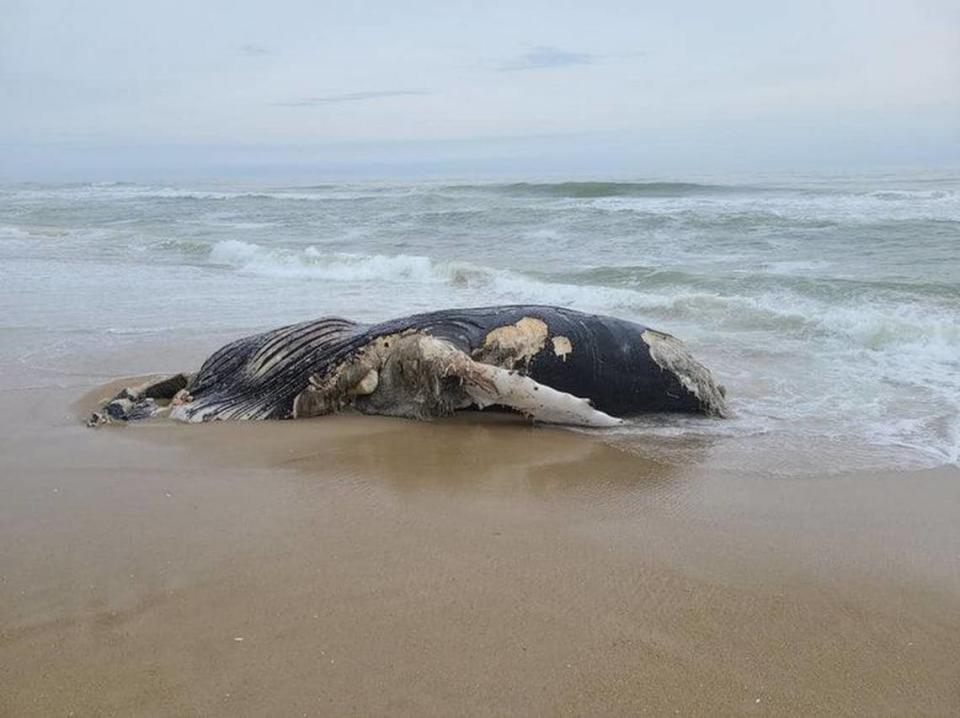Five whales have died along NC’s coast this year. Here’s what researchers know so far.
Whales found stranded along the North Carolina coast in recent years have died from parasites, infectious disease and – too many times, marine experts say – as a result of human interactions.
At least five whales have been stranded on or near the shore this year, dead or unable to be saved. They include a humpback whale, a minke whale and three dwarf sperm whales.
Dr. Craig Harms, director of the marine health program at N.C. State University’s Center for Marine Sciences and Technology in Morehead City, said the degraded condition of whale carcasses by the time they reach shore means researchers can determine a cause of death in fewer than half the recorded cases.
“But when we are able to determine cause of death, it’s usually human interaction: entanglement with fishing year, and vessel strikes.” Harms said Monday.
Harms is a member of a working group authorized by Congress under the Marine Mammal Protection Act that advises the National Oceanic and Atmospheric Administration and the U.S. Fish & Wildlife Service on what the federal government classifies as “unusual mortality events.” Those can signify environmental changes and other issues that may demand immediate action, according to NOAA.
At the moment, NOAA and Fish & Wildlife are monitoring ongoing unusual mortality events involving four species: Florida manatees, minke whales, right whales and humpback whales, all of which can at times be found in North Carolina coastal waters.
Has it been a bad year for whales so far?
The number of whale deaths so far this year is below the same time in 2023, which was an especially bad year. But minkes and humpbacks have been dying in large numbers for years; NOAA and U.S. Fish & Wildlife declared and an unusual mortality event for humpback whales in 2016 and one for minke whales in 2017.
Since 2016, at least 220 humpback whales have died along the Atlantic coast, including 30 along the North Carolina coast or just offshore, the most recent a 31.5-foot juvenile female humpback found wrapped in fishing gar at Pea Island National Wildlife Refuge on the Outer Banks on April 16.
Since 2017, at least 166 minkes have died along the Atlantic coast, including three in North Carolina, the most recent on March 5.
Harms said strandings are most common in the winter, but can happen at any time of year.

What’s killing Atlantic whales?
Marina Doshkov, marine mammal stranding coordinator for the N.C. Aquariums, said whales and other marine mammals “are just like us. They get injuries and illnesses, like viruses and bacterial infections,” and some of the whales studied in recent years have succumbed to those.
But too many, Doshkov and Harms said, are struck by boats or their propellers, or get tangled up in fishing lines or nets.
What’s being done to protect whales?
While some illnesses and infections in marine mammals can’t be prevented, NOAA and U.S. Fish & Wildlife say boaters could reduce the harm they cause these animals by:
▪ Keeping a sharp lookout for their presence. Look for blows, dorsal fins and tail flukes, but be aware that most captains report never seeing a whale prior to colliding with it.
▪ Reducing speed to 10 knots or less in areas where marine mammals are known to be present.
▪ Keeping a healthy distance – 100 yards is best – from whales in the water your distance.
▪ Stopping immediately if you spot a whale within 100 yards, and slowly distancing your vessel from the animal.
Harms says more flexible federal regulations would be helpful, such as the ability to put temporary boating or fishing restrictions in place when whales change migratory routes or move out of their traditional feeding grounds. Once the animals moved on, the rules could be lifted.
What should you do if you see a sick or injured whale?
If you see an injured or stranded whale, dead or alive, report it to the Greater Atlantic Marine Mammal Stranding Hotline at 866-755-6622 or the Southeast Marine Mammal Stranding Hotline at (877) 433-8299. You can also contact the U.S. Coast Guard on VHF Channel 16.
Large whales can be dangerous, even when sick or injured, and shouldn’t be approached by the public. Smaller marine mammals can be offered some help, though typically should not be pushed or hauled back into the water.
“They’re beached because they’re hurt or sick, and they’re probably not strong enough to survive if you put them back in the ocean,” Doshkov said.
Instead, right them, so their blowhole is facing up. If it’s a smaller animal, a wet towel placed over the back can provide some comfort, and an umbrella to provide shade can help keep the animal cool until help arrives.

